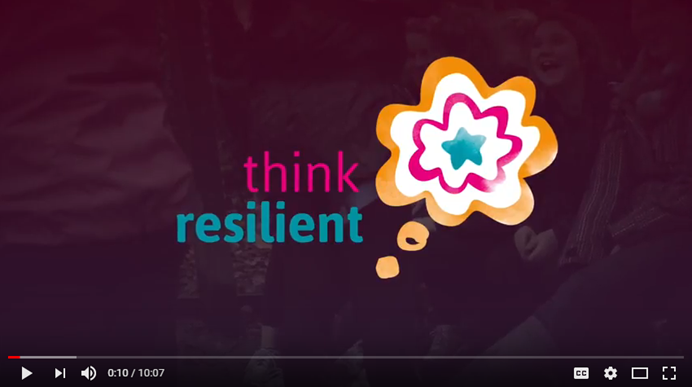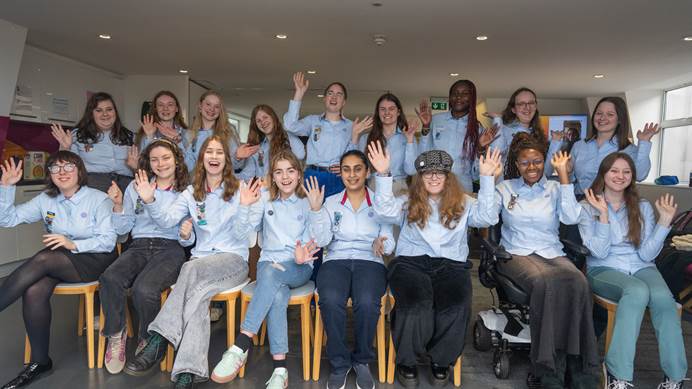Think Resilient
This peer education topic gives girls tools to build their mental wellbeing
Think Resilient is designed to build mental wellbeing and grow resilience in Brownies, Guides and Rangers.
Resilience helps girls cope when they're faced with the stresses of everyday life - whether that's in their schools, families or friendship groups - so that they can have fun, take new opportunities and have good mental wellbeing. And you can count Think Resilient towards your be well unit meeting activity hours as well!
Peer educators can bring Think Resilient to your unit
Fill in our online form to enquire about a session with a local peer educator. Don't worry if no local peer educators are trained in Think Resilient yet, trainings are happening all across the UK.
How do peer educators learn about Think Resilient?
To make sure each girl gets the best experience, peer educators need to be confident in the topics covered in the sessions. To do this, follow these simple steps:
- Watch the video below.
- Complete the online quiz below.
- Go to a face-to-face training day to practise the activities. Ask your country or region office about when these are happening.

[Music]
Mhairi: Hi, I'm Mhairi. Welcome to Think Resilient – Girlguiding's peer education resource on mental well-being.
I'm here to introduce you to what resilience is and how we help people to build it and how you can use these books to create your very own Think Resilient session. We've made this resource alongside Young Minds. Young Minds are the UK's leading charity championing well-being and mental health and young people. They helped us to develop the activities and make sure the sessions were as valuable as possible for the girls.
As long as you've already done your peer education skills training day you're only three steps away from being able to deliver your own sessions on resilience. You just need to watch this video complete the quiz and go to a face-to-face training day to practise the activities.
So what is resilience anyway? Resilience is one of the things that helps us to have good mental well-being. Good mental well-being is a positive physical, social and mental state. It's a combination of how we are feeling and how well we can cope with the things we face day to day.
Resilience is having the skills and resources to deal with challenging situations better than expected even.
Better resilience is something we can learn and build. The more we practice resilience skills the better were able to respond to the challenges we face. It's like a set of skills. On one side you have life's challenges and on the other the skills and resources you learn to cope with them. Having these skills doesn't mean things won't affect you it just means you'll be better prepared to face life's challenges, which is what resilience is all about.
The five resilience building skills – In Think Resilient we use five different skills to grow resilience.
Number 1: understanding my emotions and limits. This means knowing when you're going to feel overwhelmed or emotional. This can help to prevent those outbursts over the small things so you can work out when you need a duvet day or when you need to talk to someone about how you're feeling. This means exploring what emotions look like how we feel across the day and how well we cope with the things we face.
Number 2: positive thinking and problem-solving this is about seeing the silver lining. It's about taking small positive steps to improve situations and can make us feel empowered to make positive change in our own lives. In this section you'll become agony aunts. Break down problems into small manageable chunks and think about what you can and can't control day to day.
Number 3: self calming. This is about being able to comfort ourselves when things get difficult. Calming our minds and bodies. Here you'll practise mindfulness meditation and other calming exercises.
Number 4: identifying support networks. This is about identifying who you can go to when things get tough. It's about knowing that it's okay to ask for help and to lean on others for support. You do different activities to visually show the support networks you have: friends, family, teachers – anyone who can help you cope when things get tough.
Number 5: recognising our strengths and achievements. Realising that we are good at things can build our self-esteem and help us feel more confident in facing life's challenges. In this section you'll tell other people what you're great at and they'll say the same back to you.
The five resilience building skills: understanding my emotions and limits, positive thinking and problem-solving, self calming, identifying support networks, recognising our strengths and achievements.
Beyond these five techniques you can also remind people of the other important ways to build resilience, such as getting enough sleep, eating well, getting exercise and generally spending time doing the things that we enjoy.
We've included some links with more ideas like these.
Important things to remember – to make sure that Brownies, Guides and members of The Senior Section have clear things to remember bring up these key discussion points: mental well-being is part of everyone's health just like their physical well-being. Resilience is something you can build and needs to be practised. Everyone builds a resilience definitely through different techniques. You can always go to a trusted adult for support.
Planning and delivering your sessions – at your face-to-face training you'll get a copy of these two resources. The guide gives you all the background information you'll need to understand how to create a Think Resilient session.
The activity book has all the activities in it as well as help to link them together into one flowing workshop.
Let's start by looking at the session structure steps. Sessions kick off with the group guidelines. This sets the tone for the evening and helps you manage behaviour. You'll then go on to explore the meaning of resilience and why we need it. Then you'll work with them on four of the five resilience building techniques. Finally they'll have a think about how they're going to put this all into practice. After the session, the leader reinforces the learning by getting them to practice their resilience skills through a number of different activities. Once they've done everything they get a badge.
[Music]
To plan the session and activities first only to talk to the leader.
[Role plays a phone call]
Hi, it's Mhairi, your peer educator. I just wanted to ask you a few quick questions about your meeting.
Absolutely, what can I help you with?
During this conversation you'll want to cover: how long does the unit meet for and for spaces available. Can the leader help you get resources for the activities? Ask the leader to complete and hand out the parent letters and evaluation questionnaires. Ask the leader to download the Take it Forward activities and link the Take it Forward activities to the techniques that will be taught. So to tailor the session ask if there are any additional needs, group dynamics or cultural considerations in the unit to think about.
Explain the five different resilience building techniques and choose four of them for the unit.
For safeguarding you'll need to ask the leader where you can set up a safe space. A safe space is a place where the girls can go during a session if they need a time out. It signals to the leader and the peer educator that that girl might need a bit of additional support. Discuss how to manage the safe space if needed during a session. Discuss what should happen if a girl makes a disclosure during the session. By the end of the conversation both you and the leader will feel happy and comfortable with how you're going to run the session.
[Roleplays the conversation again]
Thanks for chatting to me. I'm looking forward to seeing ya. Thanks, bye!
A note on safety: if you see or hear anything that concerns you actively, listen, be compassionate and speak to the leader about her after the session. You may be asked to write a report and the unit leader you are visiting will take these concerns forward. Your peer education coordinator or unit leader can help you in this process.
Part of your role is also to make sure that people don't hurt themselves, so keep an eye out for hazards and keep dynamically risk assessing the room. Don't worry you'll do more of this in the face-to-face training. For further information and for the full safeguarding policy visit the Girlguiding website.
Next you choose your activities from the activity decider tools. Once you've had your leader conversation use the activity decider tool on pages 20–23 to plan your session. Here you'll find all the information you need in one convenient table. The session step of the activities, the name, the page number in the activity book, the section the activities are for, and their length. Make sure you pick a variety of activities – some really active others using creativity and brainpower. Then go to your activity book and find out the resources you'll need. Read the activity instructions and start organising. Blue text is written as a script to help you get the key points across. You don't have to but it can be useful to follow the script the first few times until you get comfortable explaining it yourself. Finally write your chosen activities into a blank session plan. You can photocopy from the book.
Now you're ready to run your session. Make sure to record it on the Survey Monkey at Girlguiding.org.uk/4sessions.
From past experience we know just how impactful these Think Resilience sessions can be so by running a session you're making a real and lasting difference. Thanks for watching this training video. We hope you got a lot out of it.
The key things we covered were: what resilience is and how we help people to build it, and how to use these resources to create your very own Think Resilience session. If you have any questions ask your trainers at the face-to-face training. Now it's time to do the quiz and see how much you remember. Thanks, goodbye and remember to think resilient!
[Music]
Take a look at the YoungMinds website for more advice on looking after your mental wellbeing.
Now take the online quiz
After your Think Resilient session
After the session with a peer educator, you can follow up Think Resilient with the Leaders: Take it Forward resource to help your girls continue to grow their resilience.



